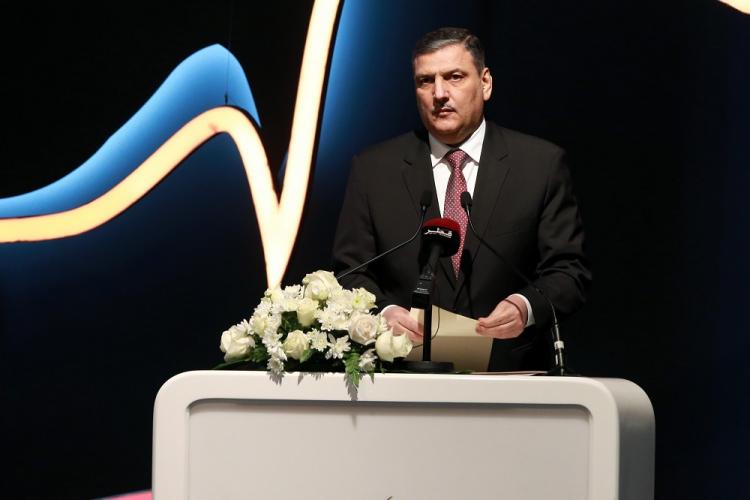
Riyad Hijab, Former Prime Minister of Syria and General Coordinator of the Opposition Higher Negotiations Committee, delivered the second keynote speech of the 11th Al Jazeera Forum, “State Crisis and the Future of the Middle East”.
He began by saying that post-colonial Arab states introduced themselves as nationalist systems of governance despite the fact that they were built on the basis of colonial agendas, adding that Syria was no exception as the Syrian people were promised nationalist projects and reforms. However, “Syrian nationalist parties, from day one, encountered several difficulties in dealing with the internal and regional situation”, he maintained.
These nationalist projects, “posed a threat to the agendas of some regional powers” and later “we came to realize that several powers in the region are involved in the internal affairs of Syria”. Consequently, the “Syrian opposition and revolutionaries are now confronted with a Persian Iranian power that provides massive and complete support for the Assad regime.
Hijab also noted that the situation drove some groups towards extremism and violence, adding that the various parties that oppose the Syrian regime have very different agendas that are not limited to getting rid of al-Assad, and that “some extremist groups sought to unite the Muslim factions under an alleged and delusive project of an Islamic Caliphate”.
In addition, the former prime minister further said that the “current regime is pretty similar to the one established by colonial France during its occupation of the region”. He added that the Syrian regime, like its counterparts in other Arab states, “has not learned from the lessons of the past” and relied on religious and ethnic minorities to deepen its roots and strengthen its rule, thus “prompting other ethnic and religious groups, as a result, to resort to extremism and violence”.
Furthermore, he maintained that it is “not possible to build a successful state on the basis of sectarian or ethnic segregation”, especially in a country with diverse sects, races, ethnicities, and entities.
The Syrian revolution, he said, began “spontaneously as a peaceful movement shaken by the events of the Arab Spring” in demand of the overthrow of a “totalitarian and outdated regime”. However, the picture has changed: the peaceful Syrian revolutionaries have “suddenly found their country thrown in the throes of internal and regional conflict, dictated by an Iranian expansionist agenda, along with other external agendas”.
In his opinion, the greatest challenge facing the Syrian opposition at the moment is “removing this sectarian regime and confronting Iran’s expansionist project in the region”. He added that the “other part of the equation is to confront Moscow's attempt to form a military axis extending from Tehran to Damascus, as well as its attempt to establish Russian military bases to be used against the Syrian people”.
He pointed out that it has become obvious to the regime’s allies and enemies that the survival of the regime under Bashar Al-Assad is no longer possible in light of the new facts on the ground.
The situation has become even more difficult in light of “the lax and inactive international attitudes” over the past years, especially concerning the regime’s use of chemical attacks and Iran’s “barbaric escalation” against the Syrians by resorting to internationally prohibited weapons.
Finally, Hijab concluded his speech by saying that there must be a firm stance against the forces of radicalism and barbarism, “as this is a battle that cannot be solved by half-measures or pseudo-solutions”, adding that the solution to the Syrian dilemma can be reached through an “alliance of civilisations” and a “firm international will in the face of tyranny”.

